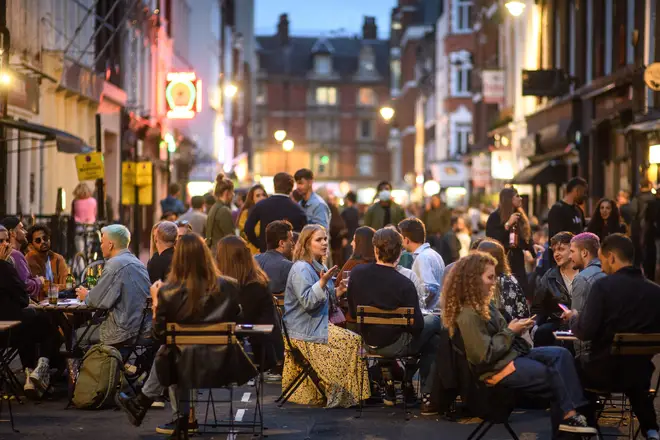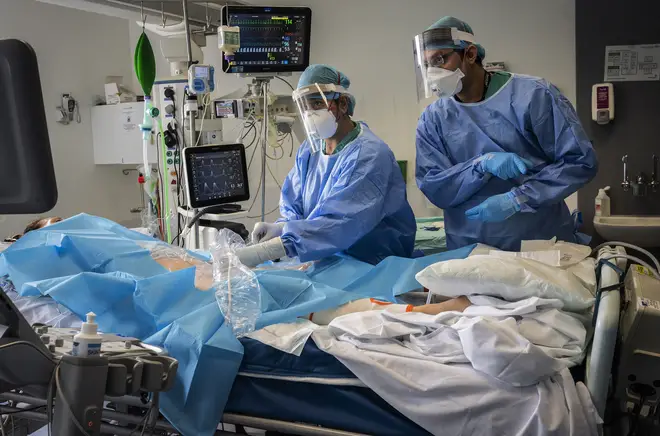
James O'Brien 10am - 1pm
6 April 2021, 08:15 | Updated: 6 April 2021, 21:37

SAGE modellers have warned the planned lockdown easing in May and June could lead to a third wave of infections, with hospital admissions rising to levels seen at the peak in January.
The experts on the government's Scientific Advisory Group for Emergencies said the step two easing on April 12, confirmed by the prime minister at a press conference on Monday, was unlikely to exert much pressure on the NHS.
But the scientists warned the proposed changes for May and June, when social mixing indoors is set to be permitted again, could see hospital admissions to rise to levels seen at the peak in January.
A preliminary paper from experts at the London School of Hygiene and Tropical Medicine (LSHTM) said their projections suggested that the expected easing in June, could "lead to a larger surge of cases and deaths comparable to that seen during the first wave".
They say maintaining some measures past June "is almost certain to save many lives and minimise the threat to hospital capacity".
Read more: Roadmap out of lockdown: Key dates for lockdown lifting in the UK
Read more: PM faces growing criticism after backing 'vaccine passports' for mass events

Boris Johnson: England's lockdown measures to be eased as planned on 12 April
While the LSHTM paper cautioned their findings were made on "pessimistic assumptions", scientists at the University of Warwick came to a similar conclusion.
The planned unlocking outlined in the roadmap would create a "distinct third wave of infection", with hospital admissions peaking between late July and mid-August, the Warwick team said.

Speaking to LBC's Nick Ferrari, Dr Mike Tildesley, who worked on the Warwick modelling, said while we have "very high levels of vaccination now... the vaccines are not 100% protective, so when we switch from an R number less than 1 that we have at the moment, to a lot of mixing later on, we may get a resurgence."
He added that while "there may well be" a third wave, he does not expect it to be "of the same scale that we saw in January".
The SAGE member said that this would leave "some very serious questions" for the government about whether to "put in controls" if hospital numbers rise.
Read more: No date for return of foreign travel but traffic light system confirmed

Dr Mike Tildesley on whether lockdown easing can be 'sped up'
The details from the Sage meeting on March 31 have been released following the prime minister's press conference on Monday, where Mr Johnson suggested plans were on course to scrap almost all restrictions by June 21.
"The roadmap continues to be one that we are sticking to like glue. All the data that I can see suggests to me that we have now reason to deviate from it," he said.
Amidst calls for the government to move faster in unlocking, Mr Johnson added: "It is by being cautious, by monitoring the data at every stage and by following the rules - remembering hand, face, space, fresh air - that we hope together to make this road map to freedom irreversible."
Read more: Australia and New Zealand to enter travel ‘bubble’ from April 19

Boris Johnson outlines plans for trialling Covid vaccine passports
On Monday, non-essential shops, hairdressers, gyms, zoos, self-contained accommodation and outdoor areas of pubs and restaurants can reopen.
Chief Medical Officer Professor Chris Whitty outlined that the data suggests the government's four tests for easing lockdown had been met, justifying this move.
However, Prof Whitty also warned: "We will have significant problems with Covid for the foreseeable future and I don't think we should pretend otherwise".
Read more: Travel chiefs call for clarity from PM on foreign trips
Read more: Border Force staff 'demoralised' as thousands of tourists enter UK each day

Dr Gabriel Scally slams 'botched' system as 20,000 tourists enter UK
In an attempt to curb outbreaks and track new variants, from Friday everyone in England will be offered twice-weekly rapid Covid tests, which will be available to order online or pickup from pharmacies, workplaces and schools.
Mr Johnson suggested this was likely to be come a part of British life, as he urged everyone to take up the regular tests.
Asked what the future will look like after June 21, the prime minister said: "I think a great deal depends on the continuing success of the vaccine rollout and us continuing to satisfy the four tests.
"If things continue to go well, I do think for many people in many ways, life will begin to get back to at least some semblance of normality."
He adds: "A world in which we continue to have testing is not going to be too onerous."